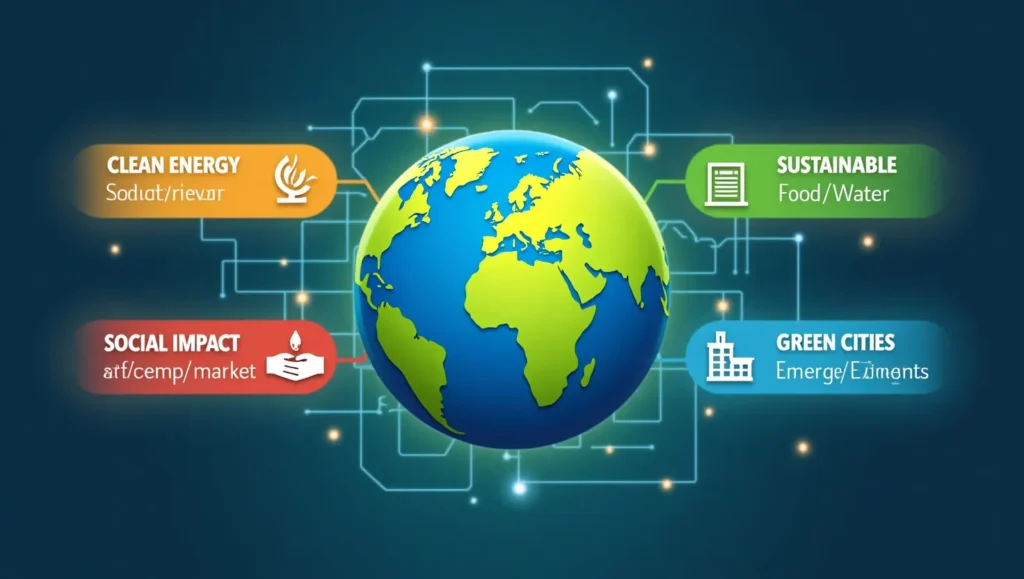Beyond Borders: Investing in Sustainable Emerging Markets for 2025 (USA, UK, Canada)
Introduction: For too long, ethical investing has largely focused on developed economies. However, as we look towards 2025, a new frontier is emerging for purpose-driven investors in the USA, UK, and Canada: sustainable investing in emerging markets. These rapidly growing economies offer unique opportunities not only for significant financial returns but also for creating measurable positive environmental and social impact. This guide will explore the compelling reasons to consider these investments, highlight their unique challenges, and provide actionable strategies to navigate this exciting, evolving landscape.
The Dual Promise: Why Sustainable Emerging Markets Now?
This section will explain the combined appeal of growth and impact in developing economies.
Untapped Growth Potential
- Rapid Development: Emerging markets (e.g., parts of Asia, Latin America, Africa) often have higher GDP growth rates than developed nations.
- Growing Middle Class: Expanding consumer bases drive demand and innovation.
Addressing Global Challenges Locally
- Direct Impact: Sustainable investments here can directly address critical issues like poverty, climate change, and access to clean energy or education.
- ESG Integration: Many emerging market companies are increasingly adopting ESG (Environmental, Social, Governance) practices, attracting conscious capital.
Understanding the Landscape: Opportunities in 2025
This section will detail where sustainable investment opportunities lie.
1. Renewable Energy & Clean Technology
- Demand: High demand for clean energy solutions (solar, wind) in rapidly industrializing nations.
- Investment Vehicles: Funds focused on renewable energy infrastructure or clean tech startups in these regions.
2. Sustainable Agriculture & Water Solutions
- Food Security: Investing in practices that enhance food security and sustainable farming.
- Water Management: Companies addressing water scarcity and pollution.
3. Financial Inclusion & Education
- Microfinance: Supporting institutions that provide financial services to underserved populations.
- Ed-Tech: Investing in educational technologies that bridge access gaps.
4. Responsible Infrastructure Development
- Green Buildings: Sustainable urban development projects.
- Eco-Friendly Transportation: Investments in public transit or electric vehicle infrastructure.

Navigating the Challenges: Risks and Due Diligence
While promising, emerging markets carry specific risks that sustainable investors must consider.
- Political and Economic Instability: Higher risks of political shifts, currency fluctuations, or regulatory changes.
- Market Volatility: Emerging markets can experience greater stock market swings than developed markets.
- Transparency and Governance: Challenges in assessing true ESG performance and corporate governance.
- Data Availability: ESG data may be less standardized or harder to find compared to developed markets.
- Liquidity Concerns: Some smaller markets or specific assets may be less liquid.
Strategies for Investing Responsibly in 2025
How to approach sustainable investing in emerging markets with care and confidence.
1. Diversify Within Emerging Markets
- Action: Don’t put all your money into one country or sector. Spread investments across different regions and industries.
2. Focus on Sustainable ETFs and Funds
- Benefit: These offer immediate diversification and are managed by professionals who vet companies for ESG criteria.
- Action: Look for ETFs or mutual funds specifically focused on “sustainable emerging markets.”
3. Research Thoroughly (Beyond the Green Label)
- Action: Look for independent ESG ratings and read fund prospectuses carefully to avoid “greenwashing.”
- Understanding Local Context: Research the specific environmental and social challenges/opportunities of the target region.
4. Adopt a Long-Term Perspective
- Patience: Emerging markets can be volatile in the short term, but long-term growth potential is significant.
5. Seek Expert Advice
- Action: Consult a financial advisor specializing in international and sustainable investments.

Conclusion: For investors in the USA, UK, and Canada looking to expand their horizons in 2025, sustainable investing in emerging markets offers a powerful convergence of financial growth and global impact. While the journey presents unique challenges, a well-diversified portfolio, a focus on reputable funds, and a long-term perspective can help you navigate the risks. By aligning your capital with companies driving positive change in developing economies, you can contribute to a more sustainable world while potentially achieving significant returns. Start exploring beyond borders and invest with purpose today.

